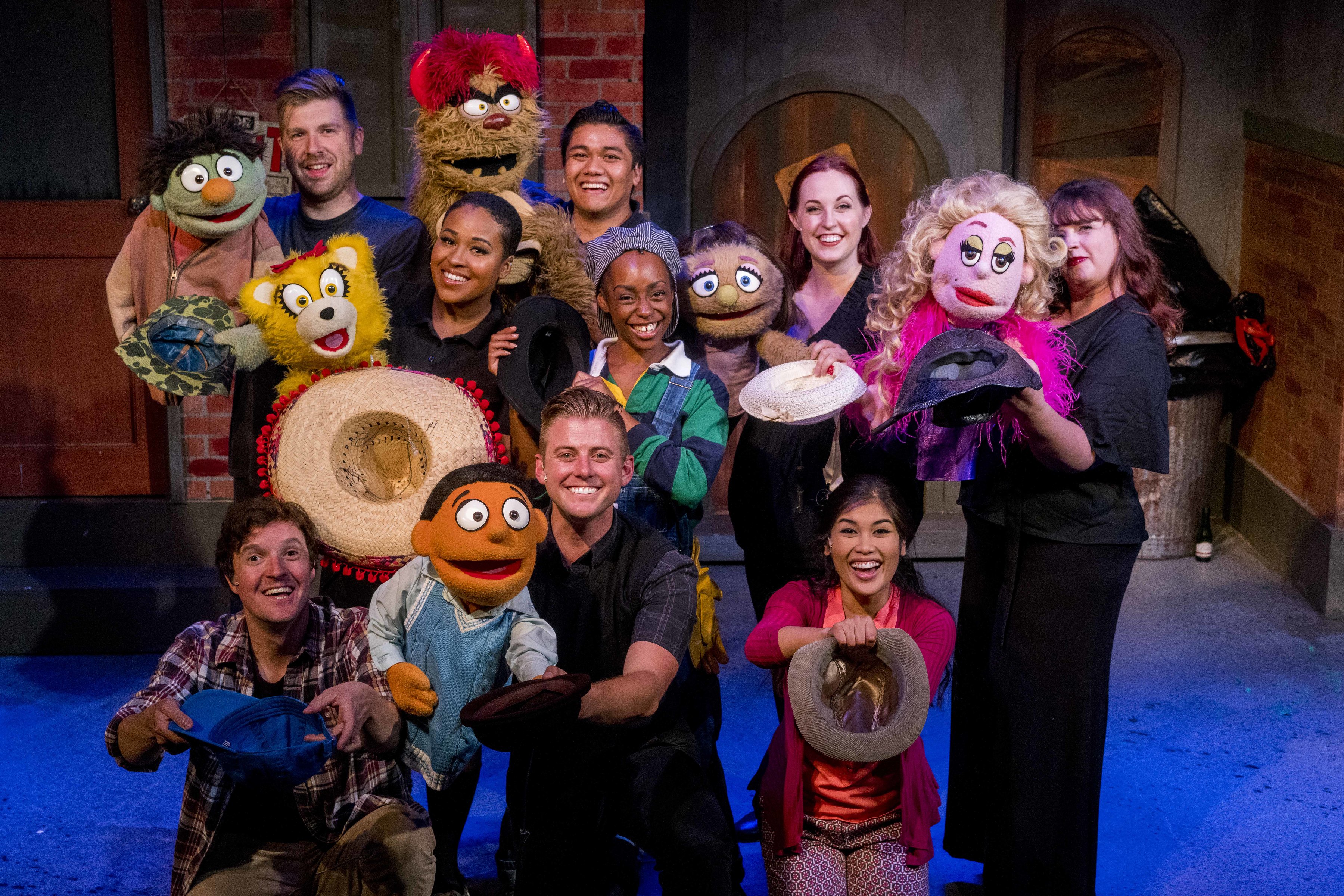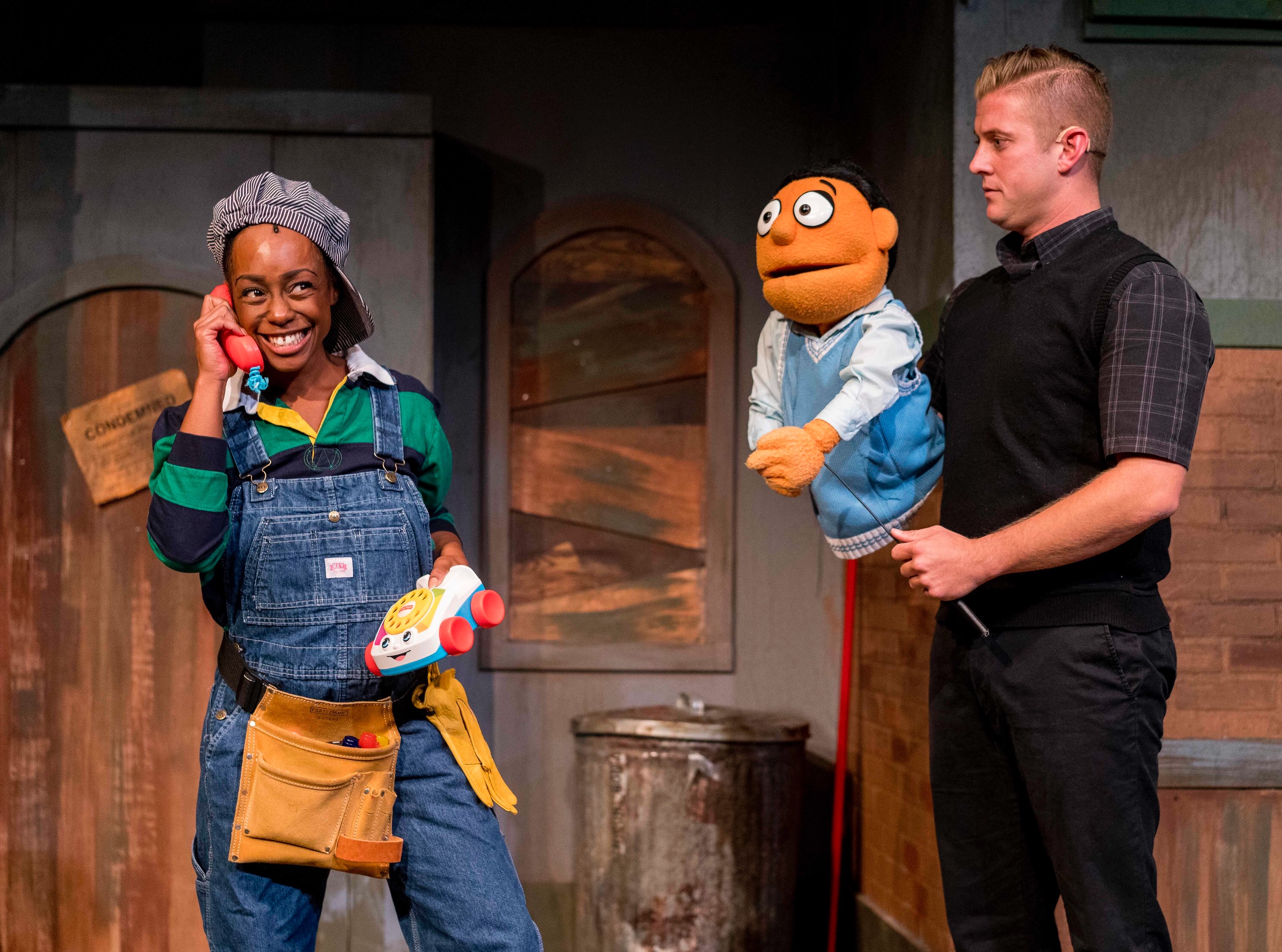Maelstrom That Is NVA’s ‘Avenue Q’ Has the Theatrical Goods from A to Z

It might suck to be these guys, but their show is another matter. Photos by Daren Scott.
Aristotle and Socrates talked about it. Thirteenth-century French minstrels presented fantoche shows that swept Europe, even in the heat of battle.
Jim Henson’s Muppets were key in transforming the face of children’s television with their 1969 introduction on Sesame Street.
That’s kind of where Avenue Q, the current kaleidoscope at New Village Arts, picks up. Not only is this 2003 Broadway show a tribute to puppetry’s stand-alone status as an art form; director AJ Knox smartly employs a number of histrionic strategies as the Henson-like characters fuse with their actor-manipulators to create a seamless presentation.
Like the marionettes of yore, these guys reflect us at our best and our worst histories — add some due diligence with the script format (more on that later, as that’s crucial to the discussion), and this Avenue Q works from A to Z.
. . . [A] universal sense of place and community peppers the neighborhood the songs depict . . .
Like their slummy New York borough setting, the gang has nowhere to go but up — witness ‘‘It Sucks to Be Me,’’ wherein everybody tries to one-up each other’s schmaltz resume. From there evolves a collision of topical sketches, including targets like political correctness, porn, break-ups, alcohol’s place in the public mind, dirty sex stuff and temporary adversity.
Each of the 24 numbers can’t be longer than six minutes, even with the dialogue that ties them together. Even so, a universal sense of place and community peppers the neighborhood the songs depict, and that’s possible because of the tunes’ diversity of intent.
While burly Trekkie Monster’s ‘‘The Internet Is for Porn’’ delights in its satire, Kate Monster’s ‘‘It’s a Fine, Fine Line’’ is a perfectly plaintive ballad over the tribulations of breaking up, and the company’s finale ‘‘For Now’’ bravely reassures us that this, too, shall pass. Not everything about this enclave is as raunchy as you’ve read, see.
Some may argue format in their efforts to decry this piece — after all, it’s only vaudevillian sketch comedy with sock creatures instead of humans in the lead roles; doesn’t the installments’ brevity sell the messages short?

Gary Coleman (Cashae Monya) wonders who’s on the other end; Princeton (Zackary Scot Wolfe) just wonders.
Knox has either painstakingly followed the script’s suggestion or created a brilliant visual aid, one that subtly yet firmly leaves the puppets in charge. While his actors fuel the puppetry, they also perch the characters on their right arms — and just as we read from left to right, our gazes train on the puppets before anything else. Knox and his actors may keep score, but the puppets run the plays.
Even as Princeton searches for his purpose in life (‘‘What Do You Do with a B.A. in English?’’), Kate Monster wants to start a school for monsters; operators Zackary Scot Wolfe and Gerilyn Brault are on the case, with Brault’s hangdog expression striking the ideal tone. Lucy the Slut (Melissa Fernandes) meets the kind of epiphany you’d imagine (or not) in a show like this, while Rod (Wolfe) sets about as a hapless gay guy in denial (‘‘My Girlfriend, Who Lives in Canada’’) even as a friend insists he looks like ‘‘a young Mike Pence.’’
[T]here’s a reason each of this show’s Tonys involves music, and Gilbert knows what it is.
‘‘You Can Be As Loud As the Hell You Want (When You’re Makin’ Love)’’ isn’t just a song title; here, it’s almost an edict (watch Cashae Monya as Gary Coleman and Tony Houck as Trekkie Monster; you’ll see). Everybody else, including three puppetless domesticates for contrast (take in Ciarlene Coleman as Christmas Eve) is up to this piece en route to a chorus of gutty postmodern performance art.
Some may call scene designer Christopher Scott Murillo’s set rather stock, but stock (as in the dialogue and business) is precisely what drives this piece. Lynne Jennings and Jenna Ingrassia-Knox do great work as the puppet coach and choreographer respectively, at once playing to the characters’ nuances and their contributions to the whole. The rest of the tech is perfectly fine behind keyboardist Nina Gilbert’s music direction — there’s a reason each of this show’s Tonys involves music, and Gilbert knows what it is.
In 2005, Avenue Q’s producers eschewed the usual post-Tony national tour profile and mounted their show in Las Vegas, at a theater literally built on the play’s success alone. Such is the extent to which the show’s themes and subthemes resonate these days — and watching NVA’s turn, I cheerfully relinquished my sense of disbelief as a nod to both theater history and the grassroots national debate.
Full disclosure: I’m also into puppet sex. I’m funny that way.
This review is based on the matinee performance of May 27. Avenue Q runs through July 1 at New Village Arts Theatre, 2727 State St. in Carlsbad. $28-$50. newvillagearts.org, (760) 433-3245.

Martin Jones Westlin, principal at editorial consultancy Words Are Not Enough and La Jolla Village News editor emeritus, has been a theater critic and editor/writer for 25 of his 47 years…
More…
